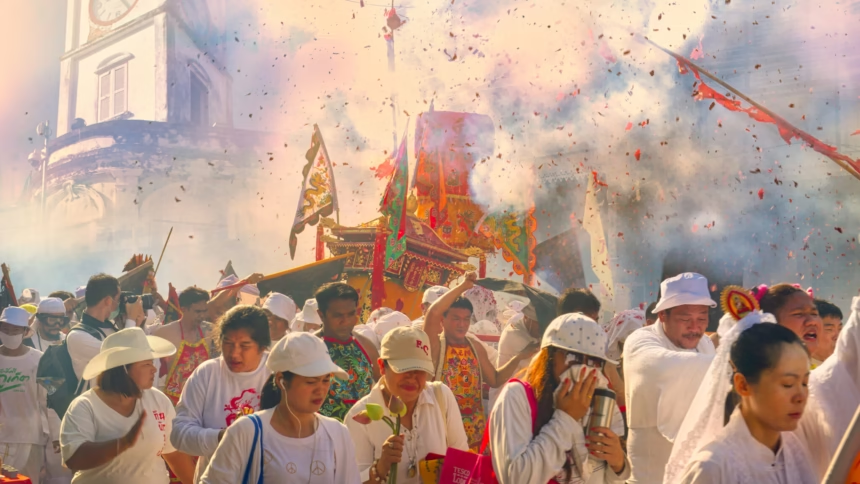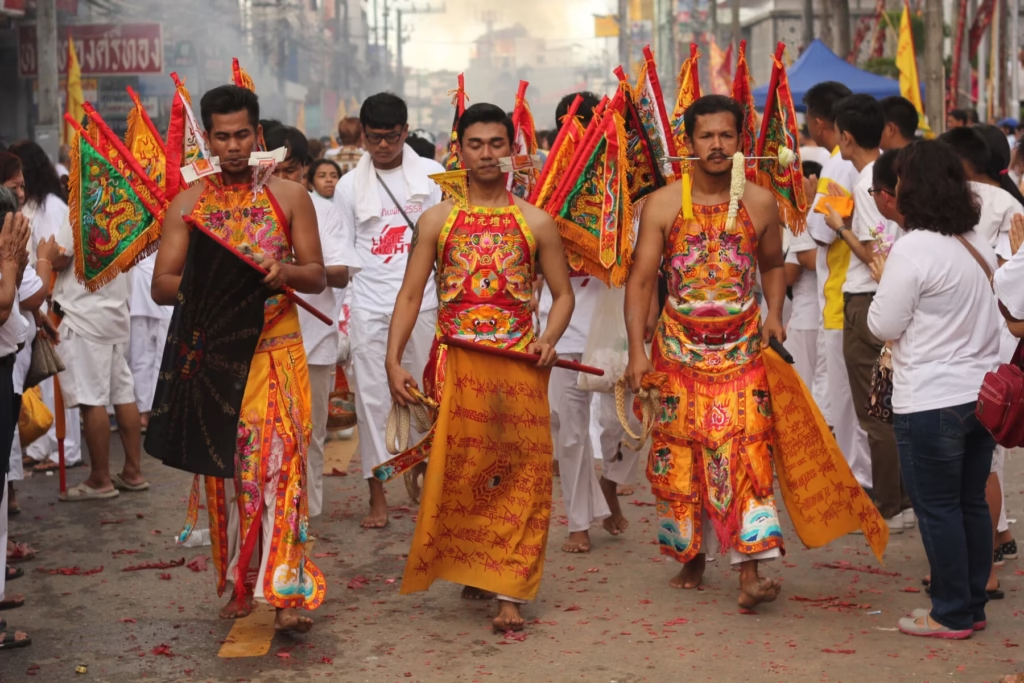PHUKET, Thailand — As sunset colours the Andaman Sea on 20 October 2025, Phuket Town stirs. Yellow flags line Thalang Road, guiding crowds to stalls serving steaming mock duck with jasmine rice. Drums echo from old shrines, and firecrackers snap through the dusk.
The Phuket Vegetarian Festival, nine days of devotion and plant-based cooking, is underway. From 21 to 29 October, this island, once a tin-mining outpost, becomes a stage for Taoist observance. Devotees in white seek purification through rites that mix beauty, grit, and belief.
With the monsoon haze lifting, this year’s festival is set to be huge. Organizers at Jui Tui Shrine expect more than 100,000 visitors. Locals honour family traditions, while travellers arrive for the spectacle. Beyond the fireworks and street food sits a deeper pulse.
The festival celebrates community, shared roots, and the blend of Chinese heritage with Thai culture. In a time of quick trends, the Vegetarian Festival, or Tesagan Gin Je, stands firm. It teaches that renewal comes from restraint, not indulgence.
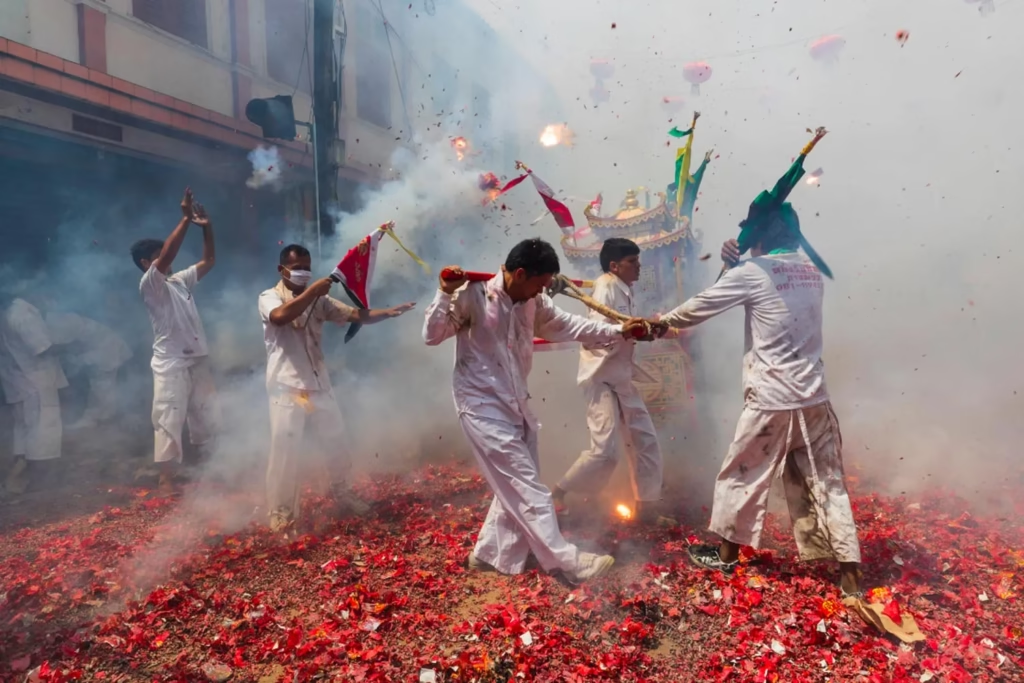
Roots in Exile: Echoes of an Older World
At heart, Phuket’s event is part of the Nine Emperor Gods Festival, a Taoist rite that began centuries ago in Fujian, China. The nine deities are linked to the Big Dipper and represent order and moral clarity. Followers believe that calling on them in the ninth lunar month cleanses the spirit, protects from harm, and invites good fortune.
The tradition found ground in Phuket during its 19th-century tin mining boom. Hokkien and Teochew migrants arrived with tools, family altars, and careful ritual. Their rites met local beliefs and shaped the island’s identity. The practice is simple yet strict. No meat, no alcohol, and no acts seen as unclean, such as sex or gossip, during the period of observance. The body becomes a vessel, and each meal acts like a quiet prayer.
For Phuket’s Peranakan families, descendants of Chinese migrants and Thai spouses, the festival is also a marker of who they are. “This festival keeps our ancestors’ whispers alive,” says 72-year-old Ah Kow of Bang Neow Shrine.
“In white robes, we lay down our burdens and carry the gods.” This cultural blend has helped Phuket gain a UNESCO City of Gastronomy title, with vegan dishes showing off the island’s mixed roots. It also speaks to life today. Many people now look for mindful eating and calmer living, and the festival offers a clear path.
Miracle in the Mines: How Phuket’s Vegetarian Festival Began
The festival’s formal start comes from a dramatic tale. In 1825, a travelling opera troupe from Fujian arrived in Kathu District to entertain miners. Disease swept through the camp, with reports of cholera or malaria. The actors devoted themselves to a strict vegetarian fast and prayed to the Nine Emperor Gods.
They recovered, and they credited divine mercy. Word spread through the Chinese quarters, and the re-enactment turned into an annual worship. By the mid-1800s, it had become a community rite, linked to shrines such as Kathu Shrine, said to be the troupe’s refuge. Early gatherings were modest.
No grand parades, just vigils with soy soups, incense, and quiet prayer. Devotees raised Go Teng poles, tall bamboo structures with lanterns to guide the gods, and kept ten precepts, including celibacy and careful speech.
Life on the island was not easy. Steep hills, fever, and hard labour tested the faithful, but the festival held firm. Records from Jui Tui Shrine, noted from 1830, describe small processions that moved from mines to the sea to invite the gods to shore. For Chinese-Thai pioneers, the rite was relief from daily struggle. Tin paid the bills, and the festival gave meaning. One diarist wrote, “In fasting, we forge unbreakable bonds with heaven and kin.”
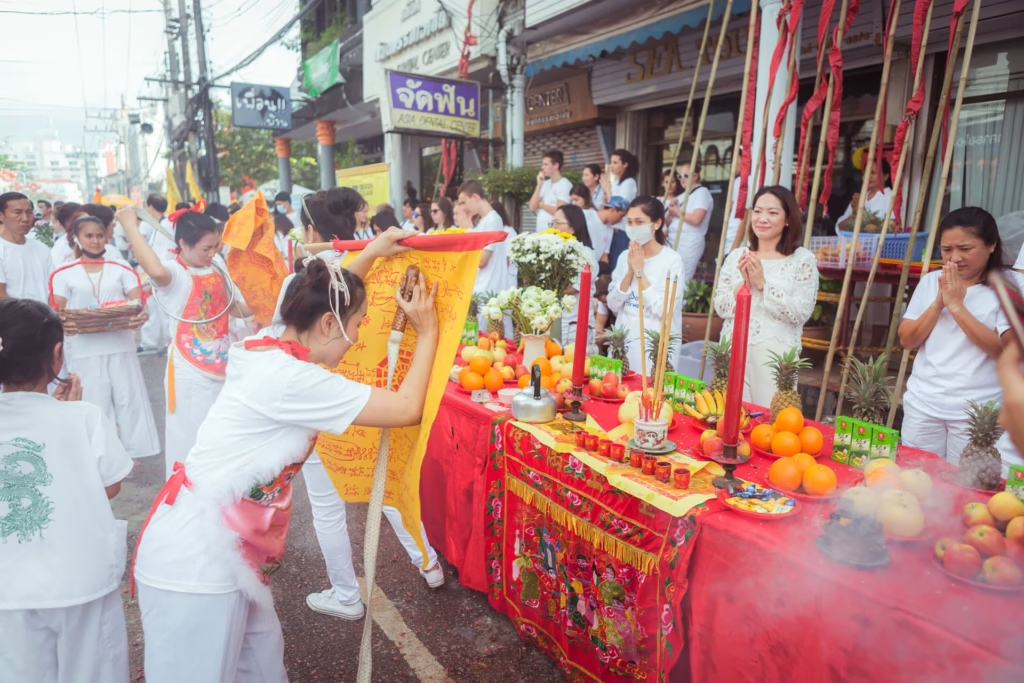
From Quiet Rites to the Worldwide Stage
Over two centuries, the Phuket Vegetarian Festival has grown from a miners’ rite into a global draw, mirroring the island’s rise from hard ground to holiday favourite. The early 20th century brought change. World War II quietened activity, but post-war growth led to expansion. By the 1950s, as tin declined and tourism grew, processions added brass bands and silk banners. Expats came to watch. During the 1970s oil crisis, devotees doubled down, taking stricter fasts as a moral answer to hard times.
Global attention lifted it further. In the 1980s, as flights filled Phuket’s airport, documentaries took the festival abroad. Private piercings shifted from backstreets to mainstream processions. Ma Song mediums, believed to channel spirits, walked in trance, carrying floral swords and bright tridents. Firewalking, later influenced by Sri Lankan practice, took hold in the 1990s. Red coals became a symbol of facing pain and passing through it.
Money now supports the show, with sponsors helping fund floats and lighting, but the core has not bent. Jae’s food remains fully vegan and prepared in separate kitchens. After the 2004 tsunami, which cost more than 5,000 lives in Phuket, the 2005 festival returned in a softer mood. It marked grief and recovery. Today, climate concerns shape the details. Many stalls cut waste, and biodegradable lanterns are common, bringing old rules on purity in line with new goals.
Some worry about a theme-park feel, as phones and selfies sit near sacred smoke. Long-time organizers answer that the spirit is intact. “We have shared our gods with the world, but they still speak to the pure-hearted,” says coordinator Mei Ling. From a few hundred in the 1820s to hundreds of thousands now, the festival shows how traditions can hold steady while the world around them shifts.
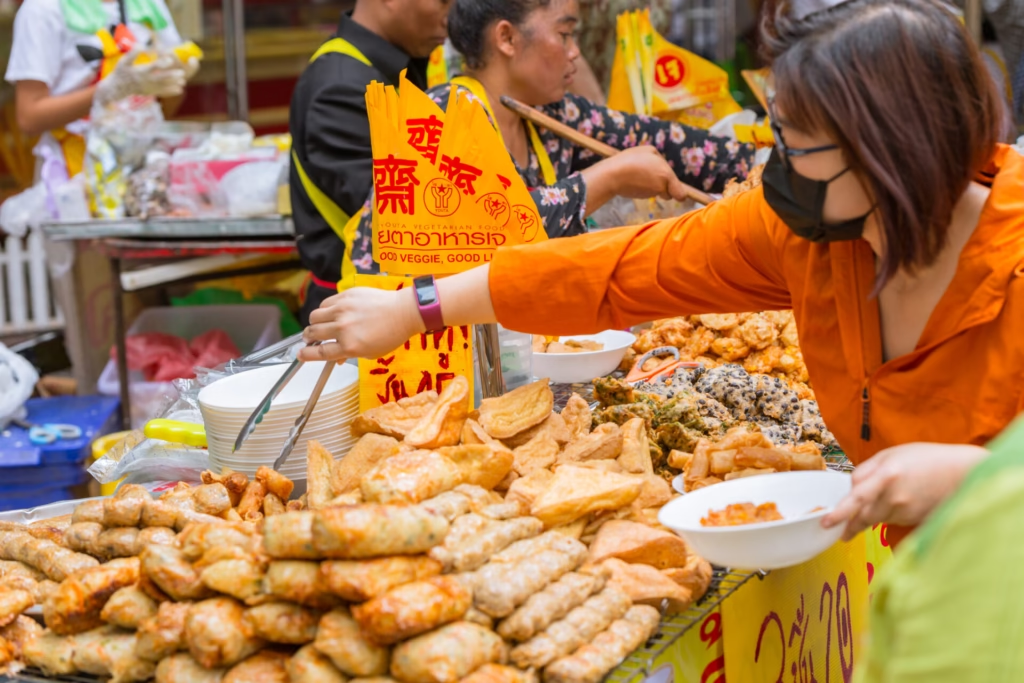
Rites that Move Body and Mind
From 21 to 29 October, ceremonies span 39 shrines. The first dawn at Jui Tui Shrine brings the raising of the Go Teng pole, with chants and conch shells, inviting the gods from the sea. Processions thread across Phuket Old Town. Ma Song walk in a trance with extreme piercings, from bicycle chains to orchid bouquets, their calm faces seen as signs of divine protection.
Day three focuses on firewalking at Kathu Shrine. Bare feet cross beds of burning coals, a public sign of courage and cleansing. Midway through the week, many take part in the Bridge Crossing at Saphan Hin, passing over bladed steps in a show of surrender to faith.
Evenings light up with Tiaw Lian, when ornate sedan chairs carry deities through streets alive with fireworks. For visitors, it is a theatre. For believers, it is intercession, where mediums absorb misfortune on behalf of others.
There is peace as well. Temples host Chao Pho blessings for families who bring fruit, incense, and prayers. All day and night, the island eats. Streets turn into vegan markets under yellow Jae flags. Expect Hokkien mee, yellow noodles with tofu duck, and Hokkien pink soup without blood, mushrooms standing in for pork in a bright broth.
Fried taro puffs, oyster mushroom omelettes, and custards without durian fill the gaps. Garlic and onions are left out to keep spiritual purity. “It is Thai-Chinese cooking at its most soulful,” says chef Nooror Srisuk, whose stall at Bang Neow draws queues. In 2025, pop-ups from Bangkok’s Green Elephant Bistro join in, mixing festival recipes with modern technique.
Safety rules guide the crowds. Masks are required in fireworks zones, and medical tents support pierced participants. Folklore says wounds heal with the gods’ help by morning, though staff stand ready to treat anyone in need.
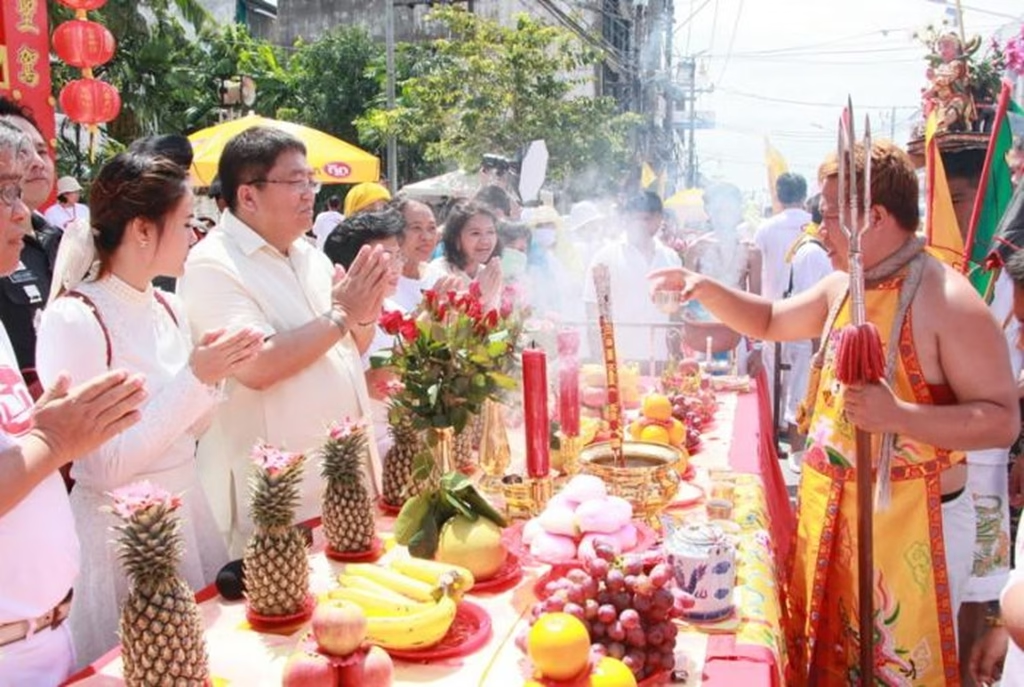
Why Phuket’s Rite Still Matters
The festival unites the island. Phuket’s Muslims, Buddhists, and spirit believers share space, food, and routes. Thai neighbours walk beside Chinese-Thai families, and Jae’s meals bring people together, similar in spirit to iftar gatherings.
The event also brings money to the town. Hotels such as Novotel Phuket City Phokeethra report strong bookings, and “VegFest” packages bundle shrine visits with plant-based spa treatments.
Abroad, it also shows how vegan practice connects to faith. It inspires events from quiet observance in Singapore to lively [Jiu Wang Ye] parades in Malaysia. Scholars, including Dr Barend ter Haar, highlight its role in preserving Hokkien speech and Peranakan crafts, from embroidered robes to incense tools.
In 2025, Thailand’s tourism body promotes it as “spiritual tourism”, with AR apps that map shrine history.
Change is part of the story. Younger devotees add hip-hop beats to drum lines, and climate groups push for solar-lit displays in place of heavy pyros. “The gods change with us,” says 28-year-old Ma Song trainee Lin Wei. The final night on 29 October closes with the pole lowered and urns taken to the sea. The message is simple. Purity invites prosperity.
In Phuket’s warm air, where sea salt meets incense, the Vegetarian Festival 2025 feels like a fresh start. For nine days, the island slows, breathes, and remembers a simple truth. By letting go, we make room for better things. As the fireworks fade and white robes are folded away, one miracle remains. A community cleansed and together, ready for whatever the stars may bring next.




